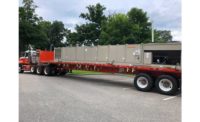As the school year starts, districts across the country are still deciding if they will have in-person classes and if the students in those classes will be wearing masks. HVAC plays a major part in these decisions, with districts spending millions of dollars to improve ventilation and add IAQ features. Several companies are promoting their solutions to the school market.
Air-Clenz Systems is one of those companies. It recently released a video specific to the school market showing how its technology helps reduce the spread of viruses in the classroom. In the video, an Air-Clenz device is placed on a student’s desk. When the student exhales, his breath is directed to the device via a plastic shield. The device then cleans and redistributes the air. The company says that using these individual devices allows “for the earlier removal of masks.”
Ron Blum, the inventor of Air-Clenz, said staff at the company studied the ways exhaled air leaves a person's mouth and nose to travel throughout an enclosed space. They also studied the limitations of a large-scale HVAC system in cleaning that air. Since the unit sits two feet from each student, Air-Clenz CEO Stuart Sheldon said, it captures pathogens faster and more effectively.
“Existing ventilation systems aren't built for the removal of pathogens quickly,” Sheldon said. “In fact, most of the time, ventilation systems pull unhealthy air across a room, past other people … rather than eliminating them."
HEPA Filter for the Classroom
Another firm takes a more traditional route to improving classroom IAQ by upgrading filtration. Steril-Aire announced the release of its new ceiling HEPA Pro+ air filtration system. The company claims this solution reduces the size, noise, and associated pressure drops of most HEPA systems currently on the market.
The Steril-Aire system is installed above the drop ceiling in a classroom. It runs independently of HVAC systems to eliminate pressure drop issues.
Both Air-Clenz and Steril-Aire say their solutions will provide benefits even after the pandemic ends. Air-Clenz said its air purifiers will help reduce the spread of more common viruses, such as the flu. Steril-Aire’s press release points to the ways HEPA filtration helps in areas experiencing wildfires.
Air Purification Draws Investors
Some investors see a long-term potential for IAQ products in schools. Wynd Technologies Inc., a Redwood, California-maker of AI-powered indoor air monitoring and purification technologies, announced recently the closing of a $10 million funding round, co-led by DBL Partners and Greensoil PropTech Ventures (GSPV). Wynd has been in the consumer market for air purification for years and recently moved into larger applications, including those for schools.
Wynd's Max room air purifier offers a 1,200-square-foot range. It can be paired with the company's Halo air quality monitor to create regular IAQ reports. The technology can be integrated with major HVAC systems and other products offering air purification solutions.
CEO and founder Raymond Wu started developing the technology after a trip to Beijing caused an adverse reaction due to the city’s large amount of air pollution. Nancy Pfund, founder and managing partner of DBL Partners, said her firm views Wynd Technologies as “a key ally in the movement for climate justice."
"Healthy and safe indoor air quality is a fundamental human right, not a privilege," Wu said.
HVAC contractors considering offering any of these products need to do their due diligence. There have been numerous companies promoting IAQ solutions since the start of the pandemic. Not all have lived up to the hype, while others have produced negative tradeoffs. Some may prove impractical or carry too high a cost for customers such as school districts, which are paying for most upgrades through one-time funding from grants and the federal government.








